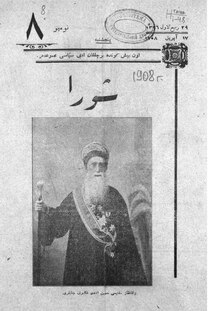Shura (Tatar: Council) was a biweekly literary and political newspaper supplement published in Orenburg, Russian Empire, between January 1908 and January 1918. The magazine featured articles written in both Turkish and Tatar languages. It was one of the most important Tatar language publications.
 Cover page of issue 8 dated 1908 | |
| Editor | Rizaeddin bin Fakhreddin |
|---|---|
| Categories |
|
| Frequency | Biweekly |
| Founder |
|
| Founded | 1908 |
| First issue | 10 January 1908 |
| Final issue | January 1918 |
| Country | Russian Empire |
| Based in | Orenburg |
| Language | |
History and profile
editShura was established by Muhammad Shakir and Zakir Ramiyev.[1] It was inspired from the Arabic magazine Al Manār which was edited by Rashid Rida in Cairo.[2][3] Shura was first published 10 January 1908.[1][4] It was a supplement of the daily newspaper Waqt which was in circulation between 1906 and 1918, and both publications were based in Orenburg.[2][5] Shura was published in Tatar language on a biweekly basis, on the first and fifteenth day of each month.[1][4] The editor of Shura was a reformist religious official, Rizaeddin bin Fakhreddin.[1][4] The editorial board of the magazine included Musa Jurullah Begiyev, Fatih Karimiy and Jamaliddin Validiy.[1]
Although its readers were Muslims, Shura was deeply influenced from Russian culture.[4] The magazine published translated versions of the articles from Al Manar[2] and other magazines, including Al Liwa.[6] Zakir Ramiyev's poems were published in Shura.[6] The magazine also featured poems about the Turkestani graveyards between 1911 and 1913.[7] The other common topics covered in the magazine were biographies of leading Muslim figures, history of the Turks and linguistics.[3] Shura also featured articles on geography and ethics.[3] The magazine published a very comprehensive obituary for Ismail Bey Gasprinski in four issues in 1914.[4]
In 1917 Shura published the numbers 23 and 24 in combination.[1] The magazine ceased publication in January 1918 when the communists occupied Orenburg and closed it.[3][4][5]
References
edit- ^ a b c d e f Alijonova Gulnozaxon (August 2020). "Shura Magazine-An Important Source on the History of Turkestan". International Journal of Progressive Sciences and Technologies. ISSN 2509-0119.
- ^ a b c Roy Bar Sadeh (Summer 2020). "Between Cairo and the Volga-Urals: Al-Manar and Islamic Modernism, 1905-17". Kritika. 21 (3): 525–553. doi:10.1353/kri.2020.0036.
- ^ a b c d Sofia Mazgarova (2010). Islamic Reformism on the Periphery of the Muslim World: Rezaeddin Fakhreddin (1895-1936) (MA thesis). Claremont Graduate University. doi:10.5642/cguetd/8.
- ^ a b c d e f Edward A. Allworth (1998). The Tatars of Crimea: Return to the Homeland: Studies and Documents. Durham; London: Duke University Press. p. 127. ISBN 0-8223-1994-2.
- ^ a b Stéphane A. Dudoignon (2006). "Echoes to Al Manār among the Muslims of the Russian Empire" (PDF). In Stéphane A. Dudoignon; Komatsu Hisao; Kosugi Yasushi (eds.). Intellectuals in the Modern Islamic World.Transmission, Transformation and Communication. London and New York: Routledge. pp. 85–116. ISBN 9780415549790. Archived from the original (PDF) on 18 April 2021.
- ^ a b Gholamali Haddad Adel; Mohammad Jafar Elmi; Hassan Taromi-Rad, eds. (2012). Periodicals of the Muslim World: An Entry from Encyclopaedia of the World of Islam. London: EWI Press. p. 190. ISBN 978-1-908433-10-7.
- ^ Ingeborg Baldauf (March 2001). "Jadidism in Central Asia within Reformism and Modernism in the Muslim World". Die Welt des Islams. 41 (1): 72–88. doi:10.1163/157006001323146830.
External links
edit- Media related to Shura magazine at Wikimedia Commons